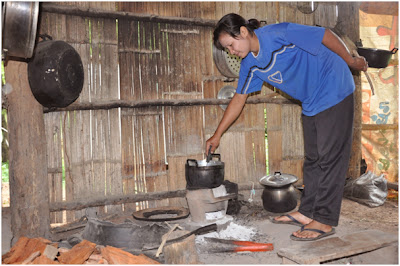 |
| Front row, left to right: Thanapon, Jariya and Sunisa. Standing: Satian. |
by Heifer Thailand
Jariya Saerum is 31 years old. She is married to Satian Buajarn, and the couple has two children: one girl, Sunisa Buajarn (age 13; in 7th grade) and one boy, Thanapon Buajarn (age 8; in 2nd grade). Her family is living at Nongjan village, Chumpae district in Khon Kaen province in northeastern Thailand. She is a self-help group member of Heifer Thailand's Community Capacity Enhancement for Sustainable Self-Reliance project.
Jariya's family earns a living from farming corn and cassava. In the off season they do daily labor. They also grow rice for their family as well as other vegetables and herbs. Her family received 14 ducks and 10 fruit tree saplings from Heifer Thailand.
Like other project participants, she received Values-Based Holistic Community Development, cornerstones, leadership, and financial management training in addition to training in basic animal care. This is in keeping with the Heifer International practice of training a community to not just care for animals, but to empower its members to better their lives and the lives of future generations.
This family's diet is mainly home-grown, seasonal vegetables and wild products such as bamboo shoots and mushrooms. Before becoming project participants, they rarely consumed meat, and their source of protein was eggs, which were the cheapest they could effort. After becoming project participants, their nutrition has improved because the ducks lay eggs everyday, and they can save the money to buy meat and other necessities.
The two children of the family help their parents to do some home chores such as feeding ducks, cleaning house, tending fires for cooking, washing dishes and washing their own clothes.
In terms of their living conditions, their house was made from bamboo with a metal sheet roof. There is one bedroom for all family members. Their bathroom door was made from a plastic sheet, and is built separately from the house. The kitchen was built from bamboo and the roof was made from grass. There is no electricity in their village, but solar power; however, the solar system generates electricity for only a few hours so the children have to rush to do their homework as soon as they return from school, otherwise they have to use candle light.
The family’s house and their rice paddies are located in the area of a national park — which is the case for many other villagers in Nongjan village — so they don’t know how long they are allowed to live here. But Jariya hopes that with the new government, there will be new policies to distribute unused land for the poor to live. She also dreams that their children will have a good education to guarantee secure jobs. But deep down in her heart, she still wishes them to live their lives with the philosophy of sufficiency and economy, and to continue her sustainable agriculture plan.
Editor's note: This post is part of a new series that follows the progress of specific families, starting at the beginning of their work with Heifer. Initially, this series will focus on our programs in Asia/South Pacific, where our colleagues have chosen one family in each region in the countries where we work and will bring us quarterly updates.
 |
| Jariya cooks in her family's kitchen. |
 |
| Thanapon (age 8) feeds his family's ducks. |

